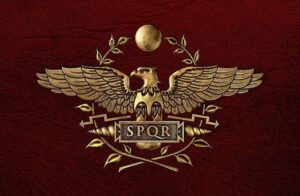This is the final question from the interview of Julius Evola in “La Nation Europeenne”.

Q. In the history of Europe, there have been different attempts to form a “European Empire”: Charlemagne, Frederick I, Frederick II, Charles V, Napoleon, Hitler, but no one has succeeded in recreating, in a stable manner, the Roman Empire. What were, in your opinion, the causes of these failures? Do you think that the construction of a European Empire is possible today? If not, what are the reasons for your pessimism?
A. In order to respond to this question in more than a summary manner, we would have to arrange for more time than is available in an interview. I will limit myself to say that the principal obstacles, in the case of the Holy Roman Empire, were the opposition of the Church, the inception of the revolt of the Third Estate (as in the case of the Communes), the birth of centralized national States that didn’t admit any superior authority, and, lastly, the non-imperial, but imperialist—politics of the French dynasty. I would not attribute a true imperial character to Napoleon’s venture. In spite of all, Napoleon was the exporter of the ideas of the French Revolution, ideas that were utilized against traditional and dynastic Europe.
As for Hitler, it would be necessary to make some reservations in the measure in which his conception of the Empire was founded on the myth of the “Volk”, conceptions that covered an aspect of collectivisation and nationalist exclusivism (ethnocentrism). It was only in the last period of the Third Reich that the views were broadened, on the one hand thanks to the idea of an Order, backed by certain factions of the SS, and on the other thanks to the international unity of European voluntary divisions that battled on the Eastern front.
On the contrary, it would not be necessary to forget the principle of a European Order that existed with the Holy Alliance (whose decline was imputable in great part to England) and also with the project called “Drei Kaiserbund” at the time of Bismark: the defensive line of the three emperors that should have also included Italy (with the Triple Alliance) and the Vatican, to oppose the anti-European manoeuvres of England and even America.
A “Reich Europa”, not a “Nation Europa”, would be the only formula acceptable from the traditional point of view for the realisation of an authentic and organic European unification. As to the possibility of realising European unity in this way, I cannot be a pessimist for the same reasons that have led me to say that today there is little room for a renaissance of “Ghibellinism”, there is no point of higher reference, there is no foundation to give firmness and legitimacy to a principle of supranational authority. One cannot in fact neglect this fundamental point and be satisfied with making the appeal to “active solidarity” of Europeans against anti-European power, going beyond every ideological difference. Even when one succeeds, with this pragmatic method, to make a unity out of Europe, there would always be the danger of seeing born, in this Europe, new disruptive contradictions, in particular as far as it concerns the ideological differences and through the effect of the lack of a principle, regarded as primordial, of a superior authority. “Community of destiny” has value only as a word of order of a practical character.
Today it is difficult to speak of a “common European culture”. Modern culture does not know borders; Europe imports and exports “Cultural heritage”, not only in the cultural domain, but also in taste, in the way of life, it always manifests more a general levelling that, joined with the productive levelling produced by science and technology, furnishes arguments not to those who desire a unified Europe, but rather to those would want to build a world State.
Again, we clash with the obstacle constituted by the nonexistence of a true superior differentiating idea that should be the nucleus of the European Empire. Beyond everything else, the general climate is unfavourable: the spiritual state of piety, of heroism, of loyalty, of honour in unity, that should serve as cement for the organic system of an imperial European Order is today, so to speak, nonexistent. The first task to accomplish should be a systematic purification of the antidemocratic and anti-Marxist spirits in the European nations. Then, it would be necessary to be able to shake up the large masses of our peoples in different ways, both by making the appeal to material interests, and with an action of a fanatic and demagogic character that, necessarily, would stimulate the subpersonal and irrational layers of man. These means would fatally entail certain risks. But all these problems can not be treated in a few words; nevertheless, I had a way of speaking of it in one of my books Men among the ruins.
Leave a Reply